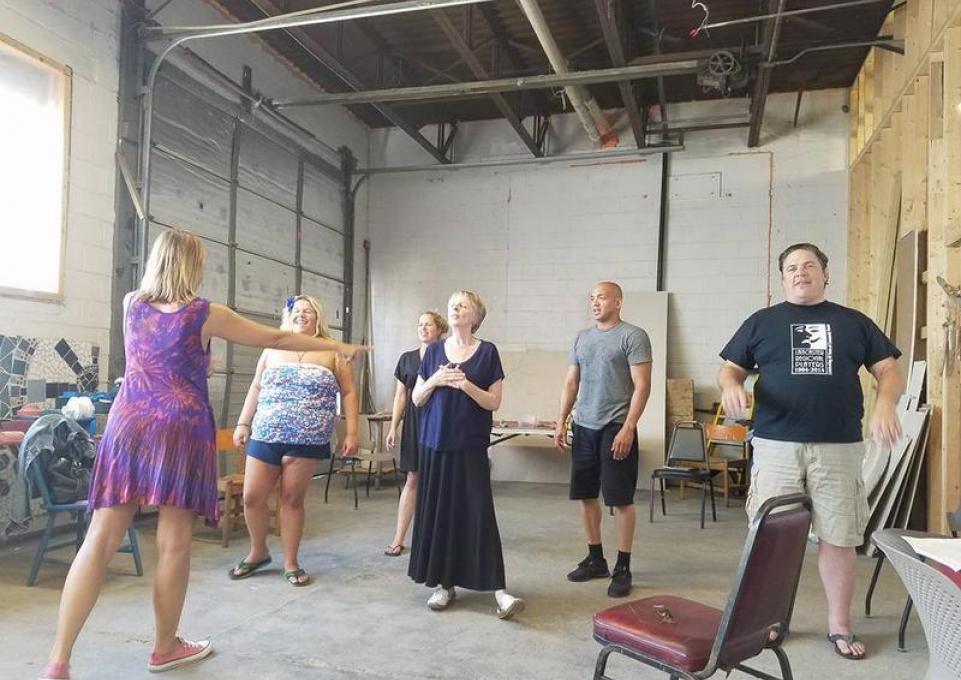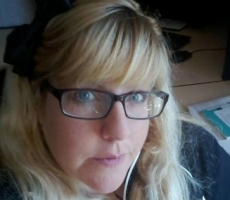
When Aimee Levesque, ’06, ’09, shares literature with her Buffalo State students, she includes authors and characters with disabilities in the mix. The English Department lecturer, who teaches such courses as Children’s Literature and the Short Story, aims to help students empathize with people living with disabilities.
It’s a world with which Levesque is intimately familiar. Her 23-year-old daughter, Jessica, was diagnosed with autism at age 3. At the time, it was estimated that 1 in 1,000 children fell on the autism spectrum. Today, the estimate is 1 in 68.
 Levesque (pictured at left), a single mother, quickly learned to become her daughter’s advocate—fighting for services and eventually heading the Ken-Ton Special Education PTA. In subsequent years, she’s served as a Western New York parent advocate, disability consultant, and on several committees with New York State Developmental Disabilities Planning Council, roles for which she’s garnered awards.
Levesque (pictured at left), a single mother, quickly learned to become her daughter’s advocate—fighting for services and eventually heading the Ken-Ton Special Education PTA. In subsequent years, she’s served as a Western New York parent advocate, disability consultant, and on several committees with New York State Developmental Disabilities Planning Council, roles for which she’s garnered awards.
While her daughter still faces challenges, Levesque said she’s functioning at a high level. A high school graduate, Jessica now participates in a self-directed day program. But when she wanted to pursue her love of acting, Jessica received many “no’s” from casting directors.
“I don’t think it was malicious,” Levesque said. “I just don’t think people see people with disabilities. Even in school plays, Jessica was relegated to behind-the-scenes work when what she wanted was to act.”
The hurdles Jessica and many others face inspired Levesque to open the Inclusive Theater of Western New York, a unique venue for performers of all abilities. Since opening in November 2015 in a rental space on the East Side, Levesque, as executive director, and Marilyn Scattoreggio, artistic director, have offered acting and writing classes taught by local professionals. They’re looking for a permanent location for the theater and plan to stage their first public play in fall 2017.
“It’s our dream not only to reimagine existing plays and be a place where diversity is the norm,” Levesque said, “but also to challenge perceptions and begin to create a world in which people are accepted and allowed to contribute to society no matter what age, physical condition, race, nationality, or gender.”
However, Levesque emphasized that this isn’t a therapeutic program; it’s a full-fledged theater.
“The actors have to be able to do the work, learn the lines, and get up on stage just like the non-disabled actors,” she said. “I want the lines to be blurred, so you don’t know who the actors with disabilities are.”
About 20 people regularly participate in the classes.
“It really is empowering for the students because it teaches them how to react to different situations, how to speak in public, and it helps them realize what they can bring to the table,” Levesque said, adding, “It’s just beautiful to see the friendships that have developed between the disabled and non-disabled actors.”
Levesque continues to transfers this spirit of inclusion to her literature classes, helping her Buffalo State students recognize hidden disabilities, as well as the hidden strengths that people with disabilities possess.
“Everyone is touched by someone with a difference,” she said.
About Aimee Levesque
After graduating magna cum laude from Buffalo State in 2006, her master’s degree in English Literature in 2009, and a master’s in library science in 2011, Levesque joined the English Department faculty as a lecturer in fall 2014. She’s working toward her doctorate in curriculum, instruction, and the science of learning (CISL) at the University at Buffalo. Her areas of expertise include eighteenth- and nineteenth-century literature, and she’s developing a specialization in the relatively new field of arts integration and disability theory.
Top photo: Actors at the Inclusive Theater of Western New York in Buffalo.
